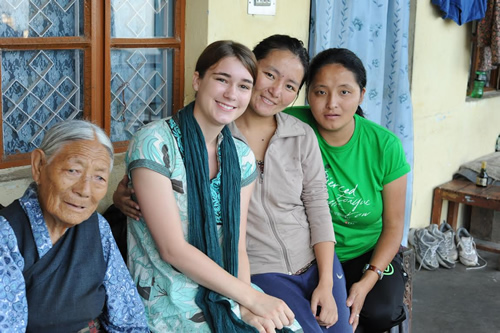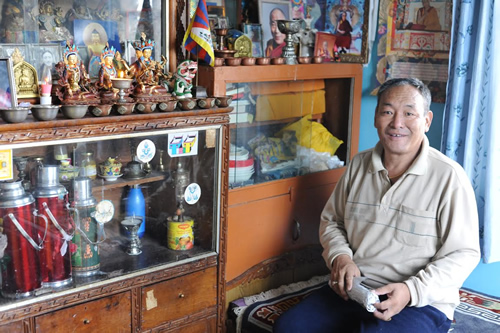 Student Writing Contest Winner Student Writing Contest Winner
How to Select the Right International Program as a Student
The 10 Essential Steps from Study to Internships Abroad
Article and photographs by Rachel Rueckert
Why Travel Abroad?
There is only so much you can learn and know about a place from a book or in a classroom. At some point, you have to decide that to really know the right place for yourself, direct experience is essential. You must see the figures in the Sistine Chapel, smell the incense smoking inside an ancient temple, taste the slippery juice from a locally grown mango in Thailand, feel the unevenness of the stone roads in Cusco as you hike, or hear the meditative calls to prayer in Morocco.

|
|
My Tibetan host family was in Dharamsala.
|
No one else can offer you that kind of education. Only you can decide if it is something to prioritize. For most, it is so much easier and safer to stay home with daily comforts and familiar paradigms. But if you are up for the challenge, traveling can be transformational, teaching you simultaneously about yourself, other cultures, and, ultimately, a little more about the world.

|
|
Prayers on rocks around Dalai Lama's Temple in Dharamsala, India.
|
My Story
I looked into international travel because I felt restless and wanted to experience something more significant than my previous exposure or knowledge. This started when I was a Brigham Young University (BYU) student. At first, I was intimidated and did not know where to start, but I just talked with people and followed leads until it became real.
I studied English and anthropology, and with the help of friends, college advisors, professors, and the honors program, I set up independent coursework that would allow me to take my studies out of the classroom while still gaining credits toward graduation in areas of my greatest interest:
-
travel writing
-
directed reading courses based on books from the host culture
-
independent study
The honors program and the international studies office, in particular, helped me find scholarships to finance my experiences while helping to find the program that best matched my interests. Ultimately, I could participate in three international study programs during college: one direct enrollment and two field studies. These two kinds of programs, in addition to other types, are explained below.
Traveling proved well worth the time and effort; not only did I have some incredible opportunities, but my field study programs, in particular, have significantly shaped my educational experience and set me up with future employers and further studies. I spent my first field study in a village in Wiamoase, Ghana, in 2010, studying the education system’s use of English. During this time, I lived in the community. I volunteered in the school daily, working with kids and teachers, regularly interviewing and observing their use of English in the classroom. In 2011, I participated in another field study in Dharamsala, India, a Tibetan settlement and home of the Dalai Lama. Here, I wrote travel essays on the area's diversity, participated in English conversation labs, and lived with a Tibetan host family. The work I did there turned into my honors thesis. Because of these experiences, I had a head start on publishing and speaking at conferences. I also believe that it was mainly because of these field studies that I could get a job at Teach for America and then enroll in a master’s degree program right after graduation — when so many of my friends struggled to find employment.

|
|
Host dad in prayer room in Dharamsala.
|

|
|
Host grandma with prayer beads in Dharamsala.
|
Guide to Picking the Right International Program for You
When studying abroad, there is no “one size fits all.” One of the most important decisions you will make is selecting the right program out of many that may fit your unique needs. Try to reflect honestly about who you are and your fundamental motives for traveling — and pick very carefully, using as many different sources of information as possible. Your decision will likely change your life in some significant ways, so you don't want to succumb to a sales pitch or apply without having done due diligence, just as you (and your parents, for example) would not select a 4-year college to attend without feeling confident that you have as much information as possible. Remember that great organizations sometimes offer relatively poor programs, and lesser-known organizations may offer excellent specialized programs.
In my experience, while there are overlaps in program types, the following are the main options offered by international organizations:
-
Study Abroad: Programs are typically thoroughly planned and structured by accompanying faculty mentors from your home university or an accredited 3rd party program provider such as CEA or AIFS and take place with a group of students. Most study abroad programs offer credits in required courses supervised or run by the accompanying faculty. Studying abroad is one of the most expensive options because it must provide much expertise in the academic subject matter and support related to visas, food, living arrangements, etc. If planning and following through with these details feels overwhelming, and you would rather someone else take care of these issues, this could be a good option for you. Often, one of the significant and unspoken benefits and motivations of this program is socializing with the group of students who are on the tour with you. Some opt to enroll directly in a foreign university, but doing so generally requires knowledge of the host country language and coordination with your home university advisor so that you gain appropriate credits.
-
Field Study: Programs are one of the most affordable and allow for more flexibility than most (both are reasons why I went this route). Field studies require more independent work, often putting together an individual academic research project to conduct in the field. While this can be more work, it can appear more attractive to future employers or set you apart on applications. The group sizes for field studies tend to be much smaller than study abroad programs (even individual), and there may or may not be a faculty mentor in the field with you. Field studies are more affordable because your only costs are tuition and local living costs, which can be cheaper, depending on the community. This approach provides profound cultural immersion experiences.
-
Internship: Like field studies, internships are another affordable option to go abroad. Usually, such programs are primarily meant to provide practical experience working in your field of interest. There are many options for internships abroad. Often, your home university will have pre-structured internships for which you can apply to participate with a small group of students. Still, there is room to scout your organization independently and pitch your skills. Internships also lead to deeper and more meaningful cultural experiences, often without as much pressure as putting together your research project, as in the case of field studies.
-
Direct Enrollment: Programs allow you to enroll for a semester at another university abroad through a partnering university, often for the same tuition cost as your original school or even much less. You will enroll in classes offered to you as a student at that university. Usually, these credits will be transferred to your university to count toward graduation requirements. This is a good option for students who want to specialize in something (like a language) that another university can readily provide. Direct enrollment offers an enriching cultural immersion experience since you will live and learn alongside locals.
-
Volunteer: While universities typically offer options for volunteering abroad, often you can find these through word of mouth or through research on the web. There are many different options available. Some cost a bit of money (be skeptical, especially if going to a developing country and ask where the funds are going). In contrast, others will potentially pay or reimburse you for some expenses. The time of commitment is also vastly different depending on the program. There are more structured programs available to which you can apply, or you can search for and set up your own volunteer experience. Your search engine is a good start, but ensure you read a plethora of reviews to see if there is a joint agreement, and make sure to read with a critical eye, as many reviews can reflect personal or concerted bias due to the relationships between the review sites and their advertisers. Contact as many people as possible who have been through the program. Please schedule a chat by asking program directors to supply their contact information. Personal stories are sometimes published on official websites, but always search multiple forms of information. For example, you can search for travel blogs from people participating in the program. Such a multi-pronged approach is an excellent way to evaluate whether a volunteer program matches you.
-
Teaching: A popular option to go abroad is through teaching (as a volunteer or paid). The international studies office at your university should post many of these options. Still, you can also do some hunting on the internet. Again, these are almost ubiquitous. Find one that suits your interests as well as one that fits your time frame and budget. Usually, you will need some experience or certification to be paid for (a TEFL license is a rigorous but quick way to get certified). Again, research thoroughly, look through reviews of the program, and contact someone to get the real story of what the program looks like on a day-to-day basis.
Words of Advice Once You Arrive at Your Destination
First, it is important to know that traveling can be hard sometimes. Culture shock is real and can last a while. What is initially thrilling and exciting can quickly turn frustrating and irritating. Recognize culture shock for what it is, and don’t beat yourself up over it. Try to avoid behaviors that may lead to isolation. Talk about what you are experiencing with people you encounter during your travels. If you feel tension between what you know and the world you now see, you are probably doing something right. It is OK to suspend some judgments and try to be open to learning from the host culture.
As much as I highly recommend keeping a personal journal and an online blog (a great portfolio to have for the future), avoid spending too much time on the internet. Your optimum time for equilibrium may vary, but about three hours a week worked best for me to balance being home versus being away. It is OK to disconnect and really engage with the local community. Being consciously present yet allowing yourself to be vulnerable in some way will only deepen your learning. Almost every destination has something to offer in real-time.
Also, remember that you are an ambassador for your program, university, country, and many other groups you may or may not mean to consciously affiliate with. Be respectful and mindful of how you represent yourself and where you are coming from. It is never good to reinforce negative stereotypes. Provide reciprocity to those who help you, and show your gratitude in a culturally appropriate way while respecting your hosts and host country.
|
The 10 Key Steps: Are You Ready and Where to Start?
-
Use the web to explore your interests — from interesting or desired destinations, commerical databases, in-depth first-hand participant reports, student blogs, many reviews sites with programs often being advertisers on the same sites (which should be reviewed with a critical eye, as with any reviews on any commercial sites) and by students.
-
Start talking with people — friends, family, professors, etc. Hear what they have to say. Try connecting with others who have gone abroad and ask them questions about their experience and how they did it. Most people are very willing to talk about their trips abroad and would love to help.
-
Start looking early — the earlier you start looking, the more likely you will find something that fits your interests. Plus, you can start financing, whether that is through a Kickstarter program, scholarships, or grants.
-
Contact college advisement centers (career services, the advisement center for your major, the international office, and others) or program coordinators if you are looking outside the university. Set up times to meet with them and talk about your interest and the program.
-
Look into at least two programs to ensure you make the best choice for your interests and goals. Remember, there is no “one size fits all.”
-
Once selecting a program, meet up with professors or group members in the program before fully committing. Get a sense of who they are and make sure it is the right fit for you..
-
Once you commit, keep researching the host culture and language. All upfront work will be precious and add to your experience. Also, connect with other people who may be going along with you on your program. It can help set your mind at ease to meet before going into an international experience together. You will likely build some of the best relationships in your life (it was certainly the case for me), so introducing yourself is an excellent step during the anticipation period.
-
Meet all deadlines and attend mandatory meetings so you do not fall behind. This includes getting the
proper
vaccinations and medications, if necessary, and applying for appropriate visas.
-
Don’t freak out — being nervous is normal. However, if you embrace the program, it will very likely be one of the best and most memorable experiences of your life..
-
Once you return, don't hesitate to share your study abroad journey with others. Your story could inspire someone else to embark on a similar adventure. And who knows, you might find yourself unable to resist the allure of more travel (as I am, currently writing this from Peru during my eight-month world tour of independent research).
|
|
Editor's note: While the main focus of this article is on the benefits of study abroad programs for career development, it's crucial to highlight the role of the educational program choice. In many cases, the study abroad and career center offices and advisors play a pivotal role in a student's program selection and long-term future.
Many articles on our site address this topic from different angles, including:
Study Abroad Increases Professional Job Prospects
Build an International Employment Profile
Use Study Abroad to Launch Your International Career: Planning Your Study Abroad Experience with a Focus on Your Future
Teaching English Overseas: A Great Stepping-Stone to International Careers
* The American Institute For Foreign Study, has also created a comprehensive PDF format analysis on Study Abroad &
Career Development, linking study abroad programs to personal postgraduate adaptation and career success, among other insights, by analyzing data from its alums. Martin Tillman, President of Global Career Compass, contributed much to the report.
|
Rachel Rueckert is a writer, photographer, teacher, and travel addict. While born and raised in Utah, she is based in Boston, Massachusetts. She studied anthropology and English at Brigham Young University, where she did fieldwork in Ghana and India.
|
